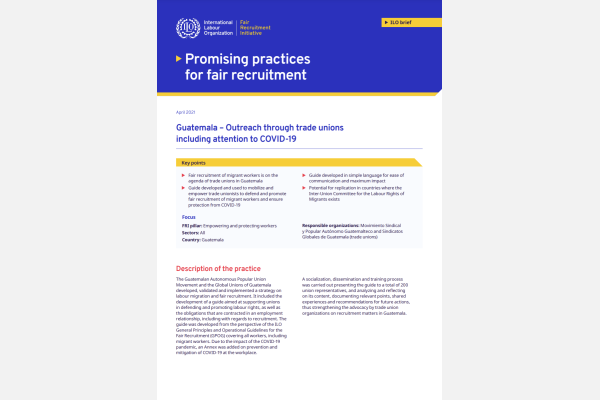Repository of Practices

Guatemala – Outreach through trade unions including attention to COVID-19
Dates
Type of practice
Summary
The Guatemalan Autonomous Popular Union Movement and the Global Unions of Guatemala developed, validated and implemented a strategy on labour migration and fair recruitment. It included the development of a guide aimed at supporting unions in defending and promoting labour rights, as well as the obligations that are contracted in an employment relationship, including with regards to recruitment. The guide was developed from the perspective of the ILO General Principles and Operational Guidelines for the Fair Recruitment (GPOG) covering all workers, including migrant workers. Due to the impact of the COVID-19 pandemic, an Annex was added on prevention and mitigation of COVID-19 at the workplace. A socialization, dissemination and training process was carried out presenting the guide to a total of 200 union representatives, and analyzing and reflecting on its content, documenting relevant points, shared experiences and recommendations for future actions, thus strengthening the advocacy by trade union organizations on recruitment matters in Guatemala.
Organizations
Main Implementing Organization(s)
Partner/Donor Organizations
Benefit and Impact
The guide that follows from this commitment was prepared in a simple language for ease of communication by union organizations and workers themselves, and is being used to reach out to migrant workers.
The Guide on decent work and fair recruitment and its annex on Covid-19 address topics of interest to trade union organizations and workers. It also includes a specific section related to fair recruitment aimed at migrant workers, thus seeking to make said topic part of the trade union agenda in Guatemala
Key Lessons
Recommendations(if the practice is to be replicated)
Innovation
Additional Resources
Date submitted:
Disclaimer: The content of this practice reflects the views of the implementers and does not necessarily reflect the views of the United Nations, the United Nations Network on Migration, and its members.
More Related Practices:
- Research on human rights violations against live-in domestic workers, and related Code of Good Practice
- Migration Lab for the domestic and home care sector
- Domestic Workers League of ACV-CSC Brussels
- Ferias y actividades multitudinarias vinculadas a trabajo con organizaciones de base
- Green Yoma for Youth on the Move
Peer Reviewer Feedback:
*References to Kosovo shall be understood to be in the context of United Nations Security Council resolution 1244 (1999).
Newsletter
Subscribe to our newsletter.

